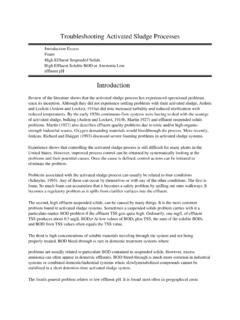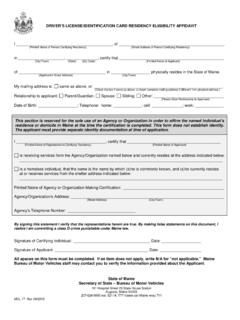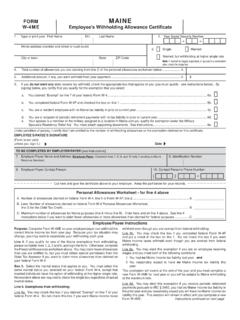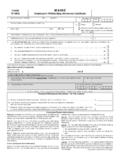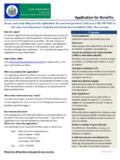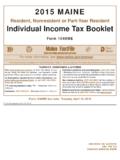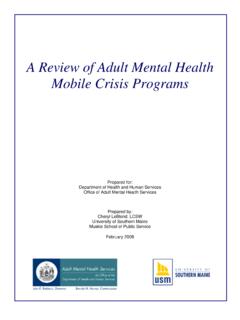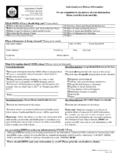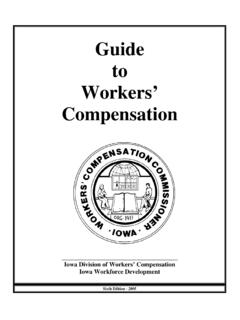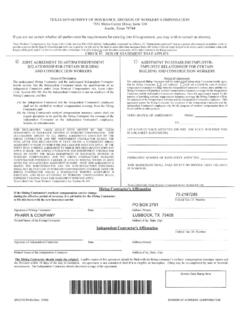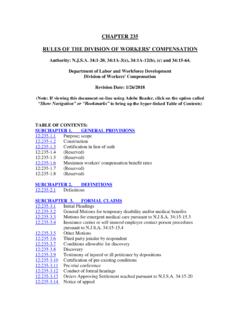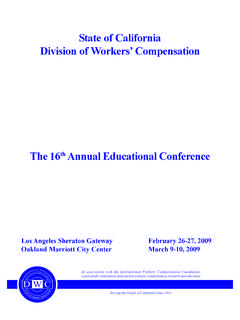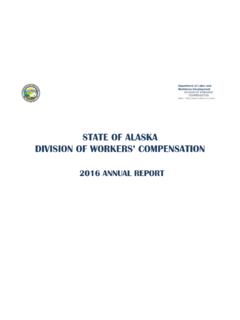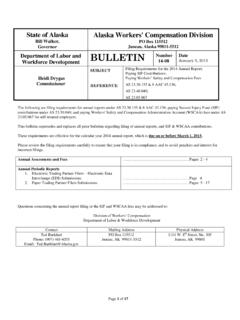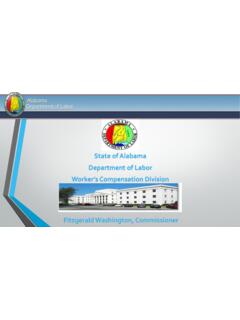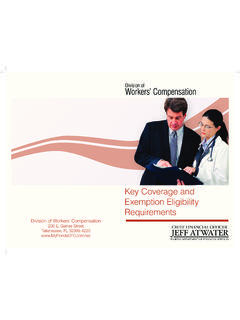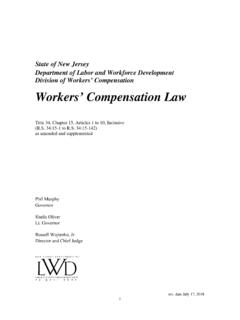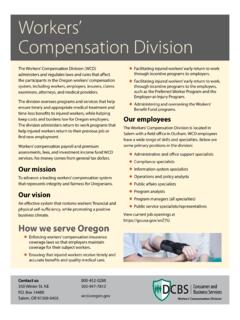Transcription of STATE OF MAINE APPELLATE DIVISION WORKERS’ …
1 STATE OF MAINE APPELLATE DIVISION WORKERS compensation BOARD Case No. App. Div. 15-0061 Decision No. 16-25 GARY A. NOLL (Appellee) v. LEPAGE BAKERIES, INC. (Appellant) and CANNON COCHRAN MANAGEMENT SERVICES, INC. Argued: June 10, 2016 Decided: August 23, 2016 EN BANC PANEL MEMBERS: Administrative Law Judges Stovall, Collier, Elwin, Goodnough, Jerome, Knopf, and Pelletier BY: Administrative Law Judge Jerome [ 1] At issue in this case is whether an employer who is self-insured for purposes of workers compensation may be ordered to reimburse an injured worker for costs associated with the reasonable and proper use of medicinal marijuana authorized by the MAINE Medical Use of Marijuana Act.
2 22 2421-2430-B (Supp. 2015) (MMUMA). [ 2] Lepage Bakeries, Inc., appeals from a decision of a Workers compensation Board administrative law judge (Hirtle, ALJ) granting Gary A. Noll s Petition for Payment of Medical and Related Services regarding a February 9, 2012, work injury. The ALJ ordered Lepage to reimburse Mr. Noll the cost of obtaining a medical marijuana certificate, medical marijuana, and 2 a vaporizer to administer medical marijuana. Lepage contends that ordering it to reimburse Mr. Noll for medical marijuana and related expenses contravenes (1) federal law and puts it at risk of prosecution because the purchase, sale, and possession of marijuana, even for medical purposes, remains illegal under the Controlled Substances Act, 21 801-904; and (2) section 2426(2) of the MMUMA, which provides that a private health insurer cannot be required to reimburse a person for the costs associated with the medical use of marijuana.
3 We affirm the ALJ s decision. I. BACKGROUND [ 3] This case was decided on stipulated facts, which are reproduced here in full: 1. The employee sustained a low back injury on February 9, 2012 while making a delivery for Lepage Bakeries, Inc. 2. The employer paid the employee s lost time and medical benefits on a voluntary basis through January 1, 2015, when it filed a Notice of Controversy. 3. The January 2015 Notice of Controversy was filed to contest a specific medical treatment the employee requested reimbursement for: expenses associated with his use of medical marijuana. 4. The grounds for the employer s denial of the requested reimbursement are that medical marijuana is classified as a Schedule I drug under the Controlled Substances Act and is illegal under federal law.
4 5. The employee used prescription pain medications for his back pain, but had difficulty tolerating their side effects; whereupon 3 his treating physiatrist, Dr. Ross, recommended he obtain a medical marijuana assessment. 6. Kevin Kenerson, assessed the employee and found him qualified for use of medical marijuana and a vaporizer in late 2014. 7. The employer selected a doctor to examine the employee in early 2015. The employer s Section 207 medical examiner, Dr. Peter Esponnette, stated in his report that the employee is one of the exceptionally few people who have noncancerous pain, non-Aids related pain, etc.
5 For whom medical marijuana is an excellent choice. He further stated he strongly advocates for the employee to use medical marijuana to treat his low back pain, especially as he has been able to discontinue his use of three other medications through his use of marijuana. 8. Based on the clear conflict between the current federal and STATE law as to the legality of the use of marijuana, the employer has refused to grant the employee s request for reimbursement of his medical marijuana expenses. [ 4] Based on these facts, the ALJ initially determined that despite Lepage s arguments, the risk of prosecution under federal law for reimbursing the employee was not sufficiently realistic to warrant denial of Mr.
6 Noll s Petition for Payment of Medical and Related Services. Moreover, Lepage failed to identify any provision of the Controlled Substances Act that would render the conduct at issue illegal. [ 5] Nonetheless, the ALJ denied the petition on the ground that Mr. Noll did not meet his burden to establish that a self-insured employer like Lepage is not a private health insurer within the meaning of the MMUMA, 22 2426(2), and is therefore subject to Mr. Noll s requested relief. 4 [ 6] Upon Mr. Noll s Motion for Additional Findings of Fact and Conclusions of Law, however, the ALJ granted the petition, determining that Lepage was not a private health insurer under the MMUMA and therefore could be required to reimburse Mr.
7 Noll. The ALJ reasoned that the Workers compensation Act defines the term employer to include the self-insured employer, but excludes self-insured employers from the definitions of insurance company, citing 39-A 102(12), (14) (Supp. 2015). Thus, a self-insured employer is excluded from the meaning of private health insurer. (Emphasis added.) [ 7] The ALJ further reasoned: [T]he Workers compensation Act defines an insurance company as any casualty insurance company that otherwise meets the requirements under Title 39-A 102(14). The MAINE Insurance Code defines health insurance and casualty insurance differently and names coverage under the Workers compensation Act as casualty insurance distinct from health insurance.
8 24-A 704, 707. The distinction in Title 24-A is consistent with Title 39-A and the Workers compensation Act s definition [of] insurance company as any casualty insurance company[.] 39-A 102(14). The definition of workers compensation insurance as casualty instead of health insurance in multiple relevant sources excludes the Employer in this case from the meaning of a private health insurer as used in 22 2426(2)(A). (Footnotes omitted.) [ 8] Finding no federal or MAINE statutory bar to ordering reimbursement, the ALJ concluded that under the stipulated facts, medical marijuana constitutes 5 reasonable and proper medical care for Mr.
9 Noll pursuant to 39-A 206, and granted the petition. Lepage filed this timely appeal. The executive director determined that the issues presented on appeal warranted consideration by the APPELLATE DIVISION en banc. See Me. Rule, ch. 13, 2(3). II. DISCUSSION A. Standard of Review [ 9] The role of the APPELLATE DIVISION is limited to assuring that the [ALJ s] factual findings are supported by competent evidence, that [the] decision involved no misconception of applicable law and that the application of the law to the facts was neither arbitrary nor without rational foundation. Pomerleau v.
10 United Parcel Serv., 464 206, 209 (Me. 1983) (quotation marks omitted). [ 10] When construing provisions of the Workers compensation Act, our purpose is to give effect to the Legislature s intent. Hanson v. Warren Co., 2010 ME 51, 12, 997 730. In so doing, we first look to the plain meaning of the statutory language, and construe that language to avoid absurd, illogical, or inconsistent results. Id. We also consider the whole statutory scheme of which the section at issue forms a part so that a harmonious result, presumably the intent of the Legislature, may be achieved. Davis v. Scott Paper Co., 507 581, 583 (Me.)

